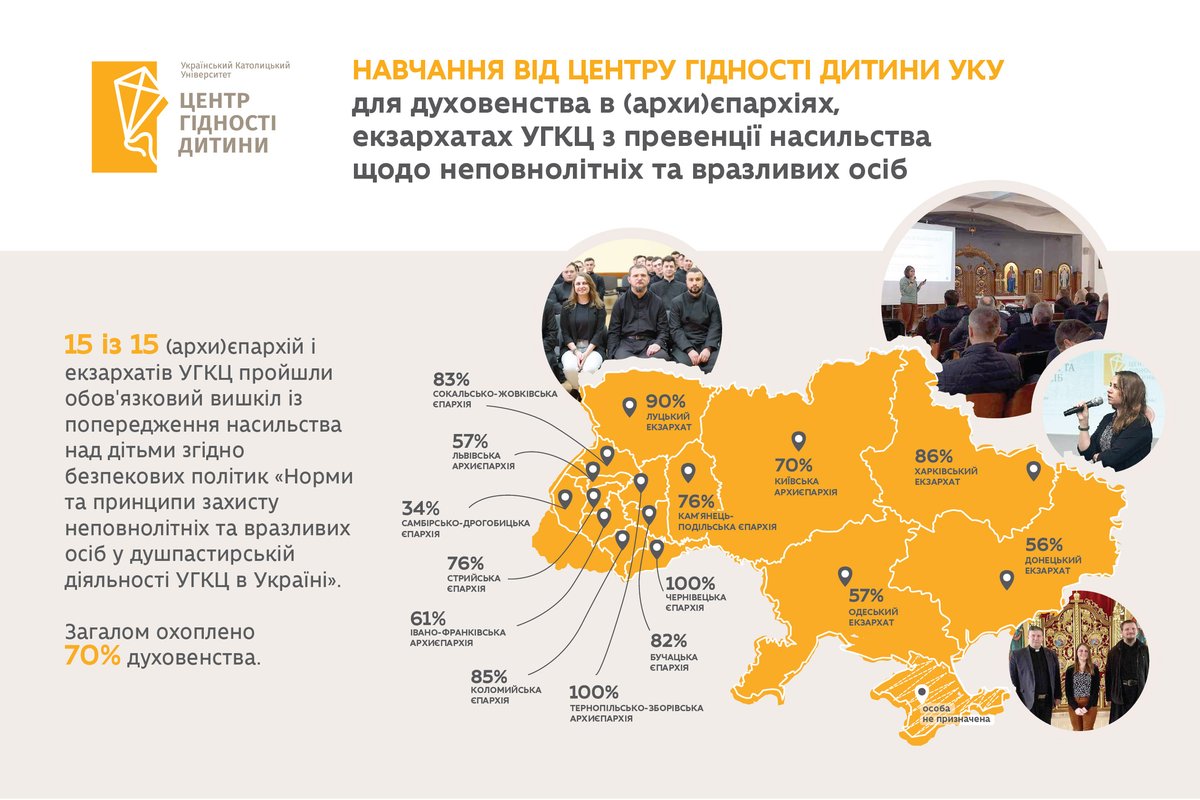15 out of 15 archdioceses and exarchates of the UGCC were trained in the prevention of violence against children
According to the safeguarding policy “Norms and Principles for the Protection of Minors and Vulnerable Persons in the Pastoral Activities of the UGCC in Ukraine,” approved in 2022 by the Synod of Bishops, priests of each diocese and exarchate of the Ukrainian Greek Catholic Church in Ukraine must undergo training on the prevention of child abuse. As part of these policies, the Center for the Dignity of the Child of the Ukrainian Catholic University has been conducting such formations for all dioceses of the UGCC since October 2022. The lectures were given by Ivanka Rudakevych, head of projects and programs, and Sava Masnyk, a study hieromonk and psychologist.
Ivanka Rudakevych said: “It is important that these trainings took place among the priests of one or more dioceses. We actually came for the whole day and talked a lot with the participants. It was an open platform to ask questions, express opinions or doubts, and share experiences. And this is very good, because the topic of violence against children is usually not talked about at all, as if it does not exist.”
The training took place with the assistance of local bishops in person and online. Thus, the clergy of the exarchates in the frontline areas were reached.
“Caring for children is imitating Christ. Children are the Church and the future of the Church. The meetings with our clergy were very important, though sometimes difficult. The fathers had the opportunity to gain more sensitivity to create a safe environment for minors in the Church. Serving the Truth can be troublesome, but it is an expression of sacrifice, especially when it comes to the abuse of minors. Therefore, it is important to understand and provide assistance in spiritual, psychological, legal, canonical, or medical aspects,” said Hieromonk Sava Masnyk.
According to the security policy of the UGCC, every priest must undergo such training every two years. Through parish priests or designated persons in the parishes, the information received should be disseminated to all members of the church community - employees, volunteers, parents, children.
“The priest is the one to whom a child with an experience of abuse can turn to during parish events, camps, individual conversations or confession. And it is important that he understands how to talk to such a child, how to respond properly, what constitutes violence and what its consequences are,” adds Ivanka Rudakevych.
Cooperation with the church has been a priority for UCU's Center for the Dignity of the Child since its foundation. The center is working to form a clergy-children-parents safety model, where those who work with children, parents, and children themselves are aware of the topic of protection. That is why its goal is to provide the church community with the knowledge and tools so that every priest, monk, nun, or lay person who works or volunteers:
- Understand personal responsibility for protecting children from violence
- understand and use mechanisms for the prevention of violence against children
- know how to respond professionally and sensitively to reports of violence
- effectively implemented the child protection policy document in their parishes and dioceses.
